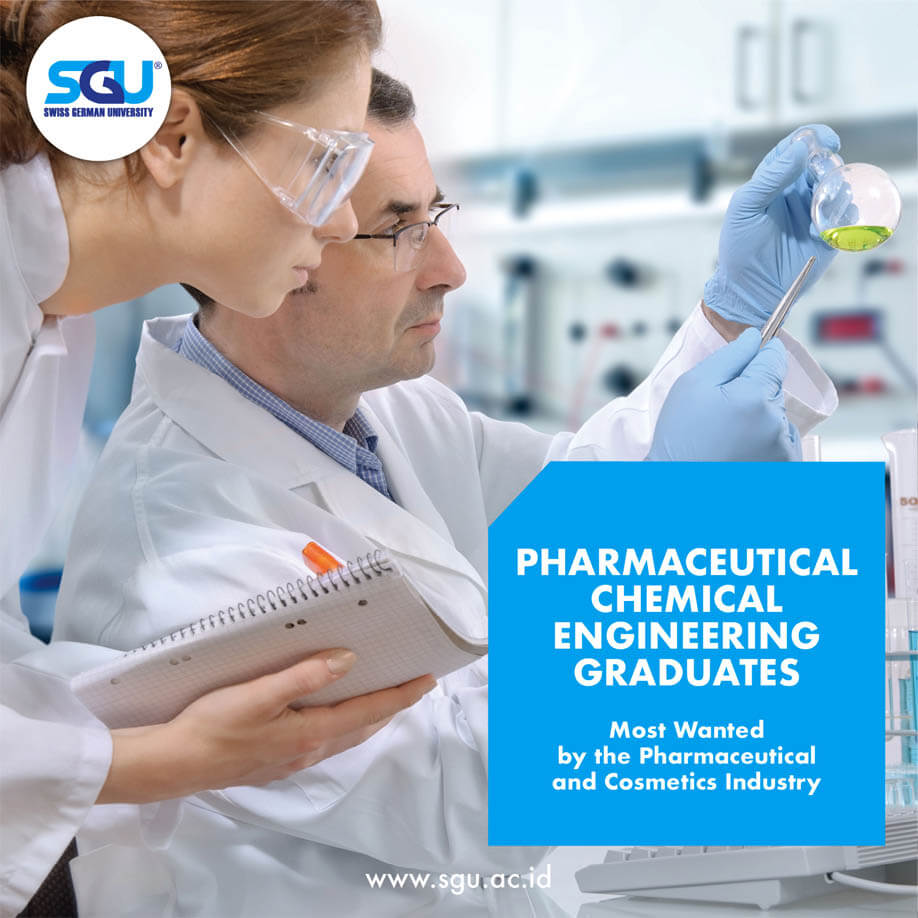
SGU Pharmaceutical Chemical Engineering Graduates: Most Wanted by the Pharmaceutical and Cosmetics Industry
Did you know that behind the cosmetics women use everyday, there is a pharmaceutical engineer behind it?
Maybe if you hear the term “study pharmaceutical engineering”, what will come to your mind is studying, formulating, and manufacturing medication that meet standards and are safe for consumption. In the end, the career prospect is to work in a company that produces medication only. In fact, by studying this field you can also work in the cosmetic and modern herbal medicine industries!
There are plenty of chemical and pharmaceutical companies in Indonesia and all over the world. Many of them need pharmaceutical chemical engineers. Unfortunately, it is very difficult for the companies to find them, since there are not many experts in pharmaceutical chemical engineering. Seeing the rare opportunities, it would be good if you want to grab the opportunity by studying Pharmaceutical Chemical Engineering in Indonesia, especially seeing this industry will continue to grow.
Swiss German University (SGU) is the first university offering a bachelor degree (S1) in the field of Pharmaceutical Chemical Engineering in Indonesia. We are also the first to offer an international double degree program in collaboration with Europe’s top universities.
Pharmaceutical Chemical Engineering is a concentration of the study program Chemical Engineering, with a focus on design, operation, and optimization of processes in pharmaceutical industries. So, in pharmaceutical engineering you learn to study and formulate medicines, herbs, or cosmetics. Meanwhile, when you study Pharmaceutical Chemical Engineering, you can find out how the production process can be carried out as efficiently as possible but still meet the feasibility standards.
There are several courses to take when studying Pharmaceutical Chemical Engineering, such as
- Basic Sciences (Chemistry, Physics, Math)
- Chemical Engineering Principles
- Pharmaceutical Process andPlant Design
- Herbal, Cosmetic Product Development
- Good Manufacturing Practice
and other relevant subjects. Through the combination of theory and industrial practical experience during the internship program in Indonesia and in Germany, you will be equipped with the strong competency needed for future professional work. Pharmaceutical Chemical Engineering offers a complete knowledge and competency of both pharmaceutical science and general chemical engineering concepts to prepare your future professional careers.
This study program combines a theoretical perspective with actual experience in pharmaceutical industries by offering an internship program in Indonesia and in Germany.
SGU Pharmaceutical Chemical Engineering study program is highly valued by many industries in the field of pharmaceutical, chemical, herbal, and cosmetics products, as well as pharmaceutical equipment and machinery companies in Indonesia. The demand for Pharmaceutical Engineering graduates in Indonesia is very high, and therefore the waiting period for the graduates to get a job is less than three months after graduation. With a pharmaceutical chemical engineering study you can grab this opportunity and contribute to the industry in Indonesia.
Tentang SGU
SWISS GERMAN UNIVERSITY (SGU) is an international university in Indonesia, was established in 2000 as a joint effort between Indonesia, Germany, Switzerland, and Austria. We are the pioneer in offering international curricula in Indonesia. Qualified students can graduate with a Double Degree from Indonesia and Germany, which SGU provides in cooperation with partner universities; surely a valuable tool for your future careers. Ever since its establishment, SGU has been dedicated to delivering quality education in line with international standards and aims to develop skilled professionals who meet the demands of the industry. In order to achieve its objectives, SGU offers quality-oriented learning through 12 Bachelor’s Degree Programs and 4 Master’s Degree Programs ranging from Engineering, Information Technology, and Business to Life Sciences and Social Sciences. Furthermore, with small class sizes, and with English as the medium of instruction, you can look forward to pursuing your tertiary education and degree with full confidence.

